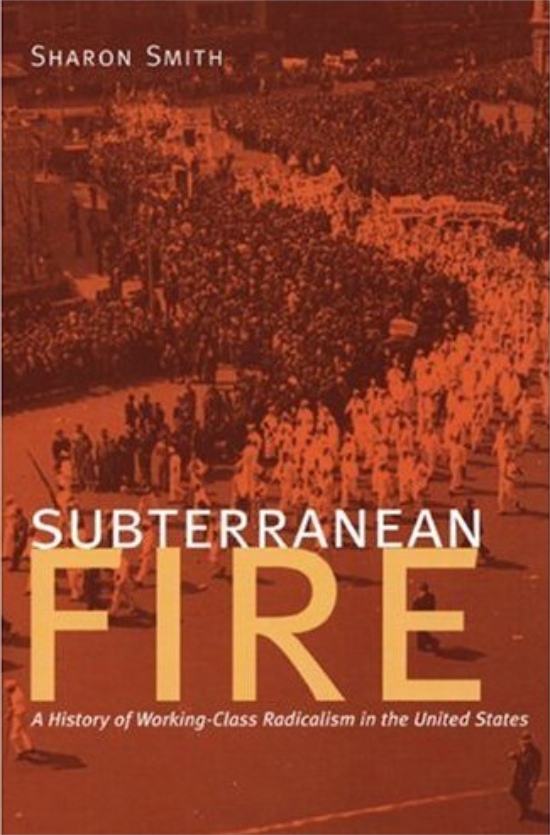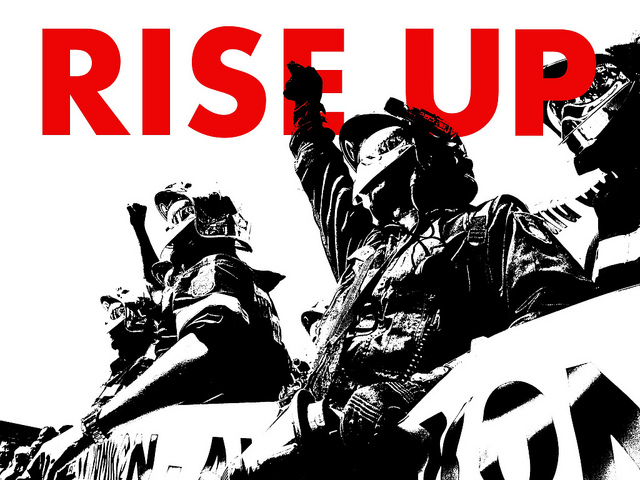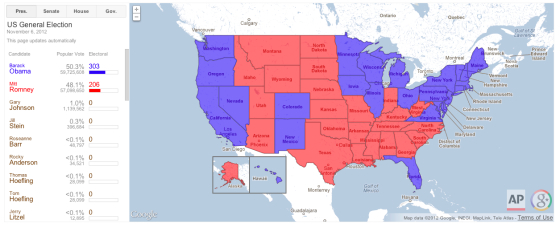empty feeder sways
over the backyard terrace
birds have flown away
For International Women’s Day
Something to Hear, on the Occasion of International Women’s Day
Marxism and Women’s Liberation – Sharon Smith
From We Are Many

What I’m Reading: Subterranean Fire
Sharon Smith presents the history of radicalism in the U.S. Labor Movement from the late 1800s forward, with an eye toward reclaiming its rich heritage for the Working Class struggles of today.
The title of the book comes from something Labor martyr August Spies said prior to his execution. “If you think that by hanging us you can stamp out the labor movement, then hang us. Here you will tread upon a spark, but here, and there, and behind you, and in front of you, the flames will blaze up. It is a subterranean fire. You cannot put it out. The ground is on fire upon which you stand.”
The Few Own The Many
 “The few own the many because they possess the means of livelihood of all. The country is governed for the richest, for the corporations, the bankers, the land speculators, and for the exploiters of labor. The majority of mankind are working people. So long as their fair demands – the ownership and control of their livelihoods – are set at naught, we can have neither men’s rights nor women’s rights. The majority of mankind is ground down by industrial oppression in order that the small remnant may live in ease.”
“The few own the many because they possess the means of livelihood of all. The country is governed for the richest, for the corporations, the bankers, the land speculators, and for the exploiters of labor. The majority of mankind are working people. So long as their fair demands – the ownership and control of their livelihoods – are set at naught, we can have neither men’s rights nor women’s rights. The majority of mankind is ground down by industrial oppression in order that the small remnant may live in ease.”
– Helen Keller
The Death Rattle of American Democracy
From Joe Kishore, at WSWS:
The Obama administration’s recently-leaked “white paper” on the assassination of US citizens, and the actions carried out on the basis of the arguments it advances, must be taken as a dire warning to the working class in the United States and around the world. The democratic rights of the people are in grave peril. The American ruling class, steeped in lawlessness and violence, is moving toward dictatorship.
READ MORE: The death rattle of American democracy – World Socialist Web Site.
The Master Class Has Always Declared The Wars
“Wars throughout history have been waged for conquest and plunder. In the Middle Ages when the feudal lords who inhabited the castles whose towers may still be seen along the Rhine concluded to enlarge their domains, to increase their power, their prestige and their wealth they declared war upon one another. But they themselves did not go to war any more than the modern feudal lords, the barons of Wall Street go to war. The feudal barons of the Middle Ages, the economic predecessors of the capitalists of our day, declared all wars. And their miserable serfs fought all the battles. The poor, ignorant serfs had been taught to revere their masters; to believe that when their masters declared war upon one another, it was their patriotic duty to fall upon one another and to cut one another’s throats for the profit and glory of the lords and barons who held them in contempt. And that is war in a nutshell. The master class has always declared the wars; the subject class has always fought the battles. The master class has had all to gain and nothing to lose, while the subject class has had nothing to gain and all to lose—especially their lives.”
The Words That Sent Debs To Prison (Full Text) – 16 June 1918, Canton Ohio

This Is No Time For Austerity
Yesterday 350 prominent economists issued a statement urging our lawmakers and the Obama Administration to focus on jobs and economic growth, not the budget deficit. I suspect that their plea will be largely ignored, unless we, the people, take responsibility for our own future and rise up in opposition to austerity.
Here is part of what the economists wrote.
The U.S. economy, once in free-fall toward a new depression, has begun to recover. But we are still mired in a prolonged slump marked by mass unemployment, rising poverty, and declining wages. And the fragile recovery is threatened by obsessive concern with cutting deficits that has infected both parties.
As even Federal Reserve Chairman Ben Bernanke recognizes, it is long term unemployment, not excessive deficits or debt, that is now inflicting the greatest human toll and economic damage. Polls show that voters agree joblessness and a bad economy are much higher priorities than deficits.
Yet too many in Washington are fixated on cutting public spending to balance the budget, not on how to put people back to work and get our economy going. There is no theory of economics that explains how we can deflate our way to recovery. Businesses are not basing investment decisions on how much Congress cuts the debt in 2023. As Great Britain, Ireland, Spain and Greece have shown, inflicting austerity on a weak economy leads to deeper recession, rising unemployment and increasing misery.
Indeed, reports this morning indicate that a second recession has already hit the Eurozone.
Please share this information widely. I’ll continue to post more on what we’re facing (and how to resist) in the coming days and weeks. Please comment or email with your own ideas and links to share as well.
Read the Economists’ Full Statement: Jobs and Growth, Not Austerity – Campaign for America’s Future.
P.S. The image above depicts firefighters in protest over budget cuts at Thessalonika, Greece on September 8th, 2012.
2012 U.S. Election Results
Google’s Politics and Elections Center has the most complete display of information I’ve found on the 2012 results, including candidates outside the two main parties.
In November, We Remember
Red November, Back November
 by Ralph Chaplin
by Ralph Chaplin
Red November, black November,
Bleak November, black and red.
Hallowed month of labor’s martyrs,
Labor’s heroes, labor’s dead.
Labor’s wrath and hope and sorrow,
Red the promise, black the threat,
Who are we not to remember?
Who are we to dare forget?
Black and red the colors blended,
Black and red the pledge we made,
Red until the fight is ended,
Black until the debt is paid.
In memory of the Haymarket Martyrs, who were executed by the State of Illinois in November of 1887.
sunday night
i look up to the heavens sunday night
if there’s a star up there to wish on
i don’t see it
if there’s a prayer
or an incantation
i don’t
know it
if there’s a reason
to believe
in anything
i suppose i believe
in leaving
well enough alone
i solemnly swear
or affirm
i swear
it’s not the tragedies that
kill us
it’s the paper
cuts


